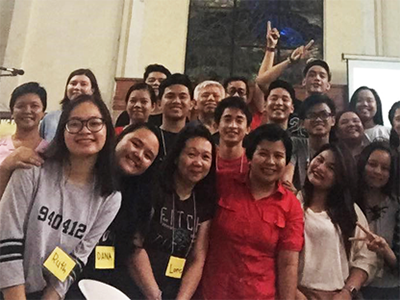Through the eyes of P.J., a 19-year-old man in Manila who recently learned he was HIV-positive, the Mary Johnston Hospital HIV/AIDS program saved his life.
"At first, I was so afraid, but with the advice and support of my friend, I decided to get tested for HIV in 2017. I tested positive," P.J. said in a follow-up interview with the counseling staff at the hospital. "I really didn't know what to do or what would happen to me. I didn't know how to tell my mother and my younger brother, but with the help of the counselors, I have become more optimistic. They taught me that I still have a chance to survive and to trust that my family would understand my condition." P.J. received the test and the follow-up counseling from Mary Johnston staff.
"After I received the result, my HIV counselor told me about a place that would support my medication needs," P.J. continued. "I went to the Manila Social Hygiene Clinic, and now I'm taking antiretroviral drugs. I am thankful and glad that Mary Johnston Hospital was the place I chose to go to because the counselors are so nice and supportive."
 |
| HIV and AIDS 101 training at St. Paul United Methodist Church, Manila, Philippines. PHOTO: COURTESY MARY JOHNSTON HOSPITAL. |
In 2017, Mary Johnston Hospital applied for a grant from the United Methodist Global AIDS Fund (Advance, #982345), administered by Global Ministries' Global Health office. The goal was to pilot an HIV/AIDS program that would educate people in the community about the disease, provide access to HIV testing, and better equip the hospital for counseling and referral services for People Living with HIV (PLHIV).
The rapid spread of HIV is a growing concern in the Philippines. In November 2016, the National Youth Commission noted the rising number of young Filipinos testing HIV-positive. The head of the commission said, "The HIV epidemic in our country has a new face, and it is the face of a young person." In addition, only 5 percent of HIV-positive pregnant women have received antiretroviral medicines to prevent mother-to-child transmission of the virus.
The HIV/AIDS program developed by the hospital seeks to complete its objectives by offering workshops and opportunities at the hospital, through community groups and partnerships, and through churches. Major areas of concentration are general HIV 101 education to inform the public about the virus; prevention, access and encouragement for testing; follow-up counseling; and the testing of pregnant mothers coming to the hospital for checkups and deliveries to anticipate and prevent mother-to-child transmission of the virus.
But for P.J., knowing his own HIV status, participating in an HIV 101 workshop at St. Paul UMC meant something deeper and more personal.
"They gave me an opportunity to be an inspiration to other people," he said. "I know that these people were the instrument of God to spread the love and the knowledge and awareness to other people so that in the near future, the stigma and discrimination will be gone. I have survived the first part of my life being a PLHIV. I'm hoping that Mary Johnston Hospital will continue to help, inspire, teach and motivate a person like me."
Christie R. House, senior writer and editor for the General Board of Global Ministries.
The Advance is the accountable, designated-giving arm of The United Methodist Church. The Advance invites contributors to designate support for projects related to the General Board of Global Ministries. Individuals, local churches, organizations, districts and annual conferences may donate to The Advance. One hundred percent of every gift to The Advance goes to the project selected by the giver. Gifts to missionaries support the entire missionary community.





